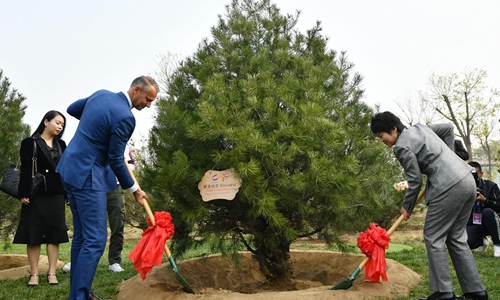HOME >> WORLD
China’s investment in Slovakia expects huge rise: Deputy PM
By Yang Kunyi Source:Global Times Published: 2019/11/26 18:23:40

Slovak Deputy Prime Minister Richard Raši (second from left) plants a Tree of Friendship with Xia Yanjun, Vice Governor of Hebei Province, in Cangzhou, North China's Hebei Province on November 9. Photo: VCG
China's cooperation with Slovakia has massive room for development, as the current investment is "deeply below its potential," but the country is ready to deepen the bilateral relations in exports and investments, said Richard Raši, Deputy Prime Minister of Slovakia.China has a relatively limited but growing presence in the Central European country, Raši told the Global Times during his visit to Beijing in early November.
China's investment is accounting for only 1 percent of total foreign direct investment in Slovakia, which translates to about 245 million euros ($269 million) and 2,800 jobs.
But with initiatives such as China International Import Expo (CIIE), 17+1 BRI, more comprehensive and result-oriented progress is expected to be made, according to the Slovak Deputy Prime Minister.
Cybersecurity, Huawei's cooperation
In recent years, more Chinese companies, including in the high-tech sector, are beginning to invest in Slovakia.
Chinese telecommunications company Huawei is among the companies that have become popular.
But as the company begins its deployment of 5G in Europe, it is being defined by the US as a "security threat."
But Slovakia still believes that the company will be able to prove its transparency.
"Chinese telecommunications companies such as Huawei, ZTE, Honor, Xiaomi are continuously trending and they are becoming more visible also in Slovakia," Raši said. "Other Chinese companies are mainly present in ICT and electronic industries, as well as in logistics."
Raši said the Slovak government understands that the politicization of Huawei, based on rumors, can be cumbersome on the global stage, but he firmly believes Huawei would be able to fully explain and prove their transparent processes and products.
Slovakia is in a coordinated cybersecurity certification system that will be implemented on products and services, which is expected to limit EU countries' concerns in this regard.
"As a member state of the European Union, we have been involved into the series of discussions on both technical and political level on this issue," Raši said. "At this point, we can only repeat our main standpoint that we do not have any interest in abandoning any companies, irrespective whether they come from the US, Europe or China, from taking part in our tenders or in our vital competition."
Increasing rail connectivity
Slovakia's potential is largely underlined by its skilled labor force and key geographic location linking Europe and Asia.
The first-ever cargo train from China to Slovakia left Dalian of Northeast China's Liaoning Province and arrived in Slovakia's capital Bratislava in November 2017, followed by another train leaving Xi'an of Northwest China's Shaanxi Province and arriving in Dunajská Streda in southern Slovakia in October.
In both cases, the journey took about 14 days, but Raši expects more developments to upgrade transcontinental transportation.
"It is my belief that more could be done in the mutually beneficial development of the area of connectivity between Europe and Asia," Raši said.
"The combination of a very good location, quality railway infrastructure and existing intermodal terminals predetermine Slovakia to be the fastest, viable and secure connection between Europe, China and other Asian countries along existing and planned transportation corridors."
As an important geographical link between Western Europe and Asia, Slovakia would like to see more substantial flows of cargo trains through its territory, Raši said.
In early November in Shanghai, Arpád Érsek, Minister of Transport and Construction of the Slovak Republic and Li Xiaopeng, Minister of Transport of the People's Republic of China, signed a Memorandum of Understanding on railway transport and logistics.
"I think we took a step in the right direction," Raši said. "I hope that both sides will fulfill this important document in good faith and to the best of their abilities, leading to better progress in this area of cooperation and enabling the Slovak Republic a deeper level of engagement with and within the Belt and Road Initiative."
Future outlook
China and Slovakia are working to enforce the bilateral relations under several projects launched by China, including the CIIE, the 17+1 platform and the Belt and Road Initiative.
In this year's CIIE in Shanghai, Raši led a delegation of 20 businessmen from Slovakia to meet business partners in Shanghai.
"We are ready to offer high-quality food exports that comply with strict EU rules and Chinese import regulations, more traditional products and, of course, also cooperation in the area of technology and innovations," Raši said.
Milk and dairy products have already been awarded with Chinese certificates, and Slovak companies are completing that process for poultry products.
Globally competitive high-end wines produced in Slovakia are expected to penetrate the Chinese market in near future.
In the realm of technology, Slovak Technical University is already actively participating in developing Chongming Island Eco-city in Shanghai.
Slovak company VRM, which specializes in airplane simulators, is also making investment in Hebei Province.
"Our relations are presently developing along four more trajectories - bilaterally, within the scope of EU-China relations, along the 17+1 platform and the Belt and Road Initiative," Raši said.
"To use a parallel, our bilateral relations provide the underlying melody for our cooperation that is amplified by EU-China cooperation and further enriched by 17+1 and BRI formats. These formats are complementary and should not serve to replace, but to deepen our cooperation."
"I gladly confirm that the Slovak Republic is ready to build upon our traditional friendship with China in order to widen and deepen our cooperation at all levels, including intensification of our result-oriented dialogue, diversification of exports, better use of the existing potential in the area of investments, innovations, and logistics as well as enhancement of people-to-people exchanges," Raši said.
Newspaper headline: Exploring potential
Posted in: EUROPE